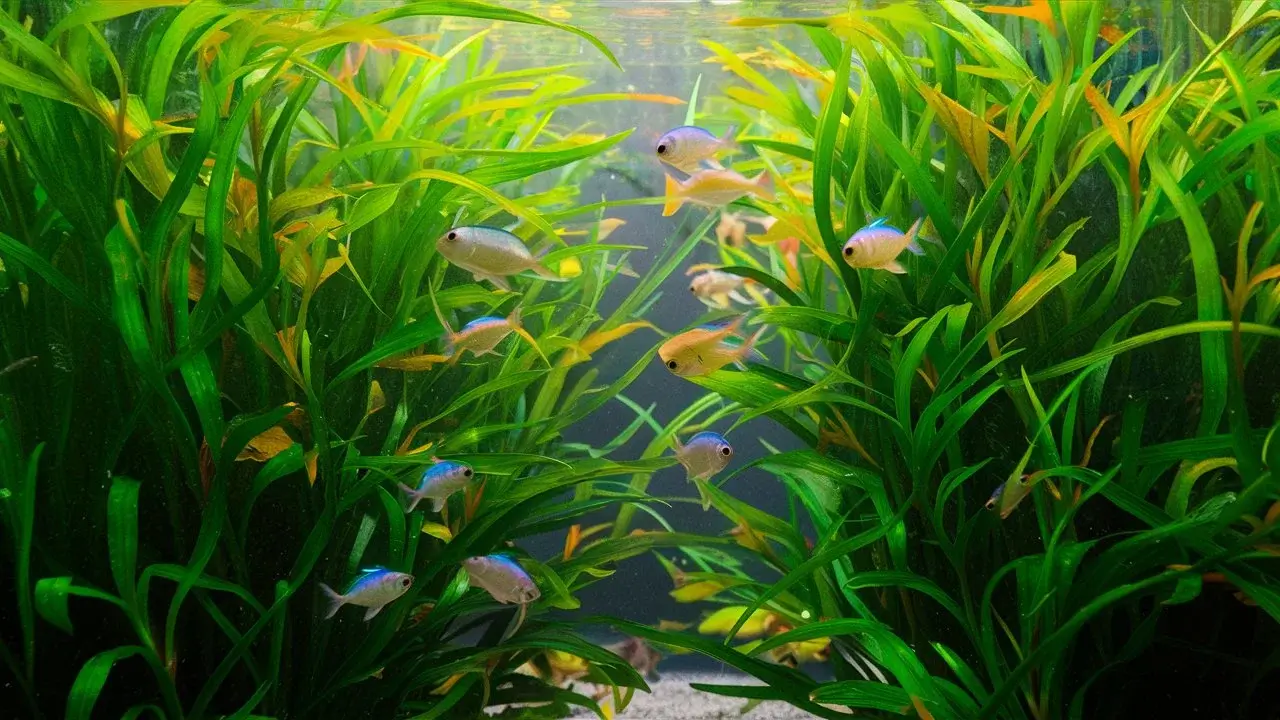Guppy grass, known scientifically as Najas guadalupensis. This is a type of water plant that’s really popular in fish tanks and ponds. People love it because it’s not only pretty but also very helpful for the water creatures living with it. Let’s break down what makes guppy grass special and how you can grow it and why it’s a good choice for your aquarium or pond.
What is Guppy Grass?
Guppy grass is a green and leafy plant that lives under water. It grows fast and can get quite long. Fish and tiny water animals like to hide in it and it helps make the water cleaner and healthier for them to live in.
Why People Like It
- Good for Fish: Guppy grass is like a playground for fish and especially baby fish (fry) who use it to hide from bigger fish.
- Cleans the Water: This plant is great at taking bad stuff out of the water which helps keep the water clean.
- Easy to Grow: You don’t need to be an expert to grow guppy grass. It’s strong and grows fast without needing a lot of care.
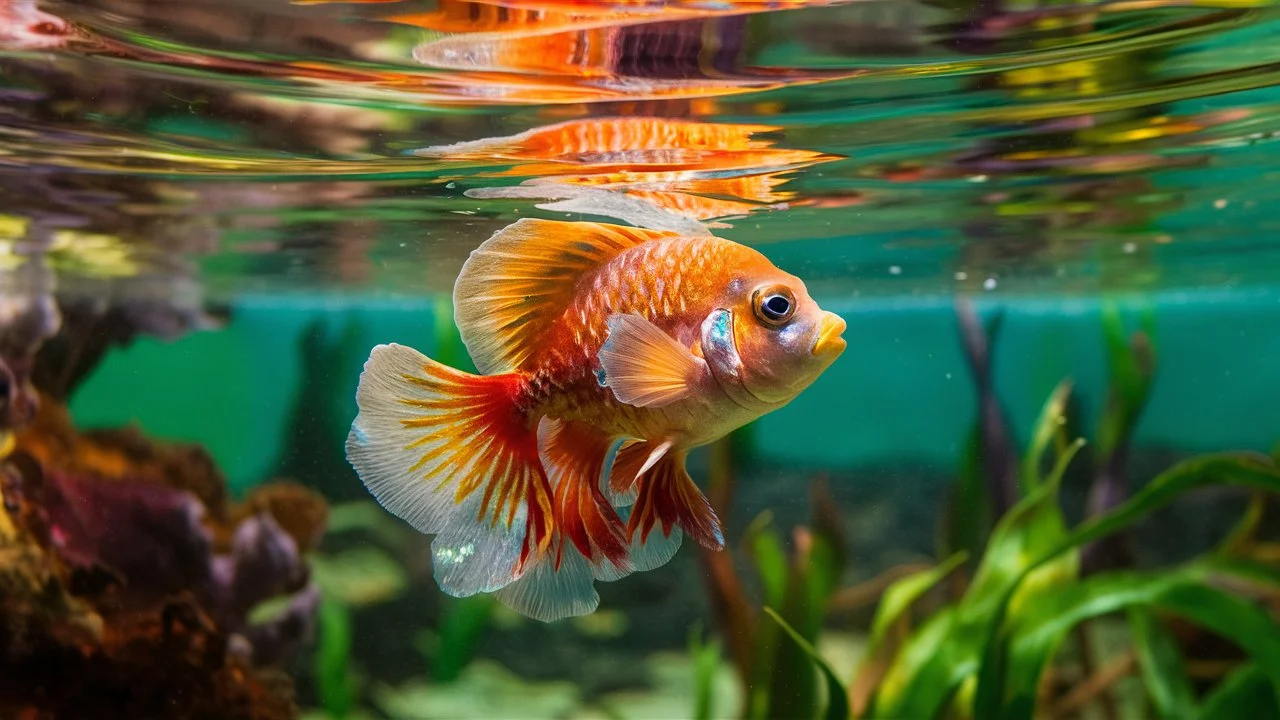
Growing Guppy Grass
- Light: Guppy grass likes light but not too much. If it gets too much light it might not grow well.
- Water: It’s not picky about water. It can grow in different conditions but it does best in water that’s not too hard.
- Planting: You can just let it float in the water or plant it in the bottom. Both ways work well.
Taking Care of Your Guppy Grass
- Trimming: Because it grows fast you’ll need to cut it back now and then to keep it from taking over.
- Water Changes: Like with other plants and fish changing some of the water regularly helps keep the guppy grass happy.
- Watching for Problems: Sometimes if the water conditions aren’t right, the plant can start to look brown or not grow well. If this happens checking the water and making small changes can help.
Characteristics of Guppy Grass
Guppy grass is a popular plant for fish tanks and outdoor ponds. It’s known for its fast growth and the benefits it brings to the water and its inhabitants. Let’s dive into what guppy grass looks like how it grows and the good things it does for the environment underwater.
What Guppy Grass Looks Like
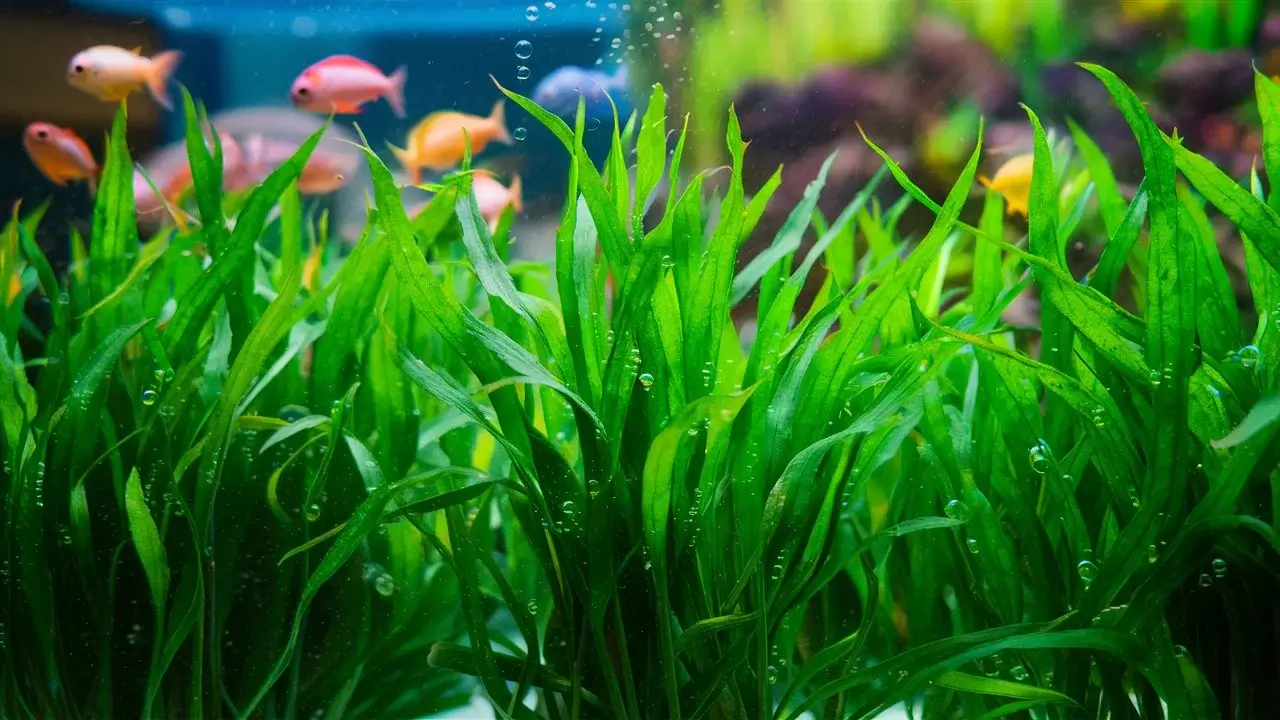
Guppy grass is a bright green plant that grows underwater. Its leaves are thin and a bit like needles which spread out along its stems. The plant can grow quite long and it usually looks like a soft and green cloud floating in the water. Since it grows fast you can see it change and spread out over time and filling up space with its leafy branches.
How Guppy Grass Grows
This plant is pretty easy-going when it comes to growing. It can either float freely in the water or be planted in the bottom of a tank or pond. Guppy grass doesn’t need special dirt or pots to grow; it’s happy just being in water. It’s a quick grower which means it can cover a lot of space in a short time. This fast growth is great for creating hiding spots for fish but also means you might have to trim it back now and then to keep it under control.
Good Things Guppy Grass Does for Water
- Homes for Fish: Guppy grass makes a great place for fish to hide especially for baby fish (fry) who might be scared of bigger fish. Its thick growth gives them a safe spot to stay in.
- Cleans the Water: This plant is like a natural filter. It takes in bad stuff from the water, like bits of fish waste and other pollutants and helps keep the water clean and clear. This makes the water healthier for fish and other aquatic creatures.
- Oxygen Maker: Guppy grass like all plants turns carbon dioxide into oxygen during the day. This process adds more oxygen to the water which is good for fish and helps them breathe easier.
Benefits of Guppy Grass
Guppy grass isn’t just a plant that looks nice in an aquarium or pond; it has a lot of benefits for the water and the creatures living in it. Let’s talk about how it helps by giving shelter to fish, cleaning the water and being easy to take care of.
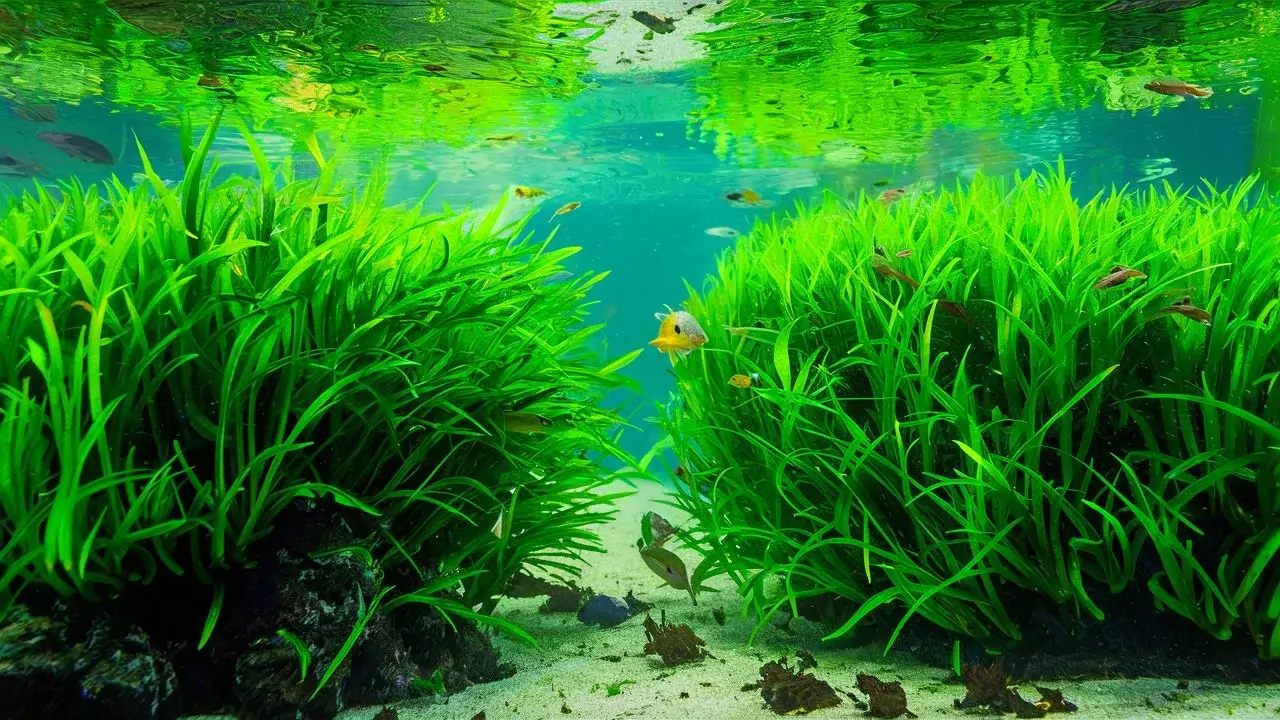
Shelter and Protection for Fish
One of the best things about guppy grass is how it helps fish, especially the little baby fish called fry. The grass grows thick and fast making a perfect hiding spot for them. This is really important because in a tank or pond and small fish often need to hide from bigger fish to stay safe. With guppy grass they can duck into its leaves and stems whenever they feel scared or threatened making it much easier for them to survive in their early days.
Water Purification Attributes
Guppy grass is like a superhero for water quality. It has a special ability to clean the water by taking in harmful stuff like ammonia, nitrates and phosphates which are waste products from fish. By absorbing these guppy grass helps reduce the chances of water becoming dirty or harmful to fish. Plus, it can help keep the water clear, so not only does your tank or pond look better but the fish are healthier and happier too.
Ease of Cultivation and Maintenance
Another big plus of guppy grass is how easy it is to grow and take care of. You don’t need to be a plant expert or have a green thumb. Guppy grass doesn’t need special soil or a lot of light to grow. You can let it float freely in the water or anchor it down in the substrate (the material at the bottom of your tank). It’s pretty tough and can grow in a range of conditions which makes it perfect for beginners or anyone who doesn’t want a high-maintenance plant. And if it starts to grow too much, just trim it back with scissors.
Maintenance and Care of Guppy Grass
Taking care of guppy grass is important if you want to keep your aquarium or pond looking its best. Luckily, it’s not hard to do! By following a few simple steps like trimming the grass, changing the water and keeping an eye on the plant’s health, you can make sure your guppy grass thrives.
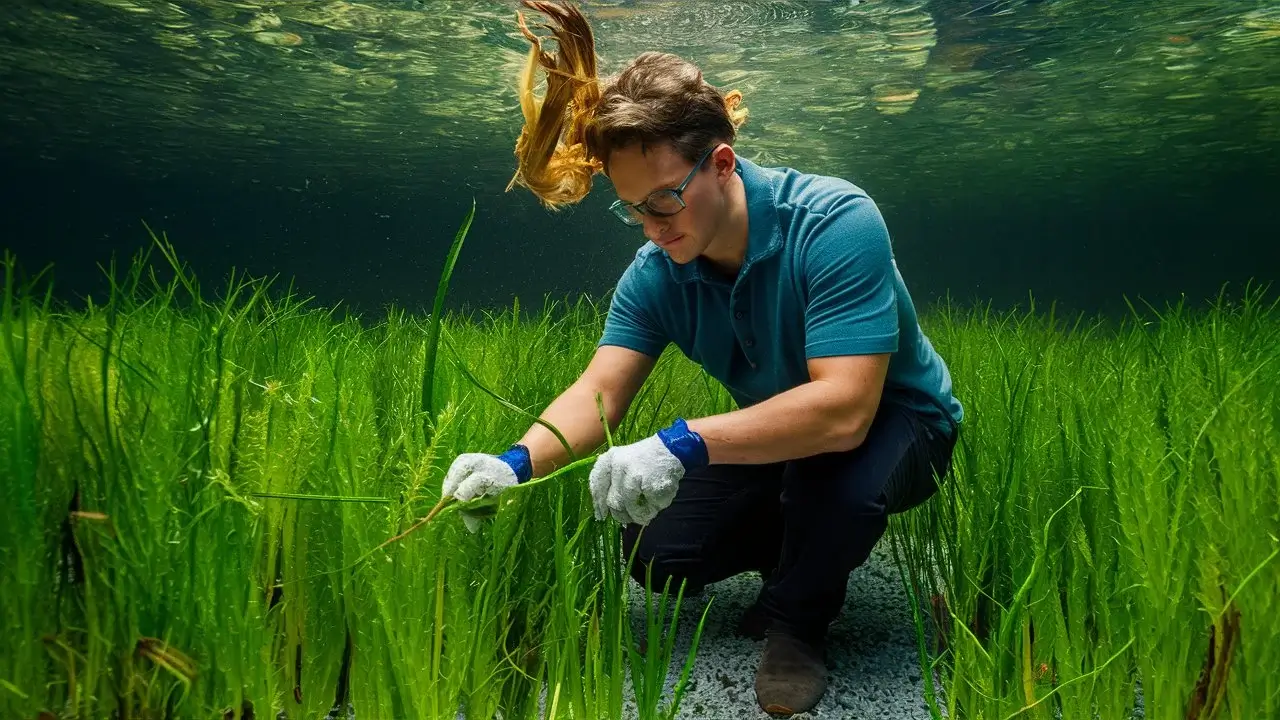
Regular Trimming and Controlling Growth
Guppy grass grows quickly which is mostly a good thing. But sometimes it can grow too much and take over the space where your fish live. That’s why trimming it regularly is important. Use a pair of scissors to cut back the longer stems, making sure there’s still enough room for your fish to swim around freely. This not only keeps your tank looking neat but also makes sure the grass doesn’t use up all the nutrients in the water, leaving enough for other plants and animals.
Importance of Water Changes
Changing the water in your tank or pond is crucial for keeping your guppy grass healthy. Even though guppy grass helps clean the water by absorbing waste and it can’t do everything by itself. Regularly changing some of the water (about 20-30% every couple of weeks) helps remove the stuff the grass can’t handle like excess nutrients and chemicals that build up over time. This keeps the water fresh and healthy for both your plants and fish.
Monitoring for Health and Signs of Distress
Just like other living things guppy grass can sometimes get sick or stressed. Keep an eye on your plant for any signs that it’s not happy. If the leaves turn yellow or brown or if the stems start breaking easily it might mean the water conditions aren’t right or the plant is lacking nutrients. Check the water’s pH level and temperature to make sure they’re in the right range for guppy grass and consider adding aquarium plant food if necessary. Catching problems early can help you fix them before they harm your plant or your fish.
Conclusion
Guppy grass is more than just a plant; it’s a fantastic addition to any aquarium or pond. It brings beauty with its lush and green leaves and creates a natural playground for fish, especially the tiny ones. This plant doesn’t just look good; it works hard too, cleaning the water by sucking up the bad stuff and giving back oxygen, making a healthier home for all underwater life.One of the best things about guppy grass is how easy it is to take care of. It grows happily with minimal fuss, making it perfect for both beginners and expert fish keepers. Regular trimming helps keep it in check, and a little attention to the water it lives in ensures it stays healthy and does its job well.
